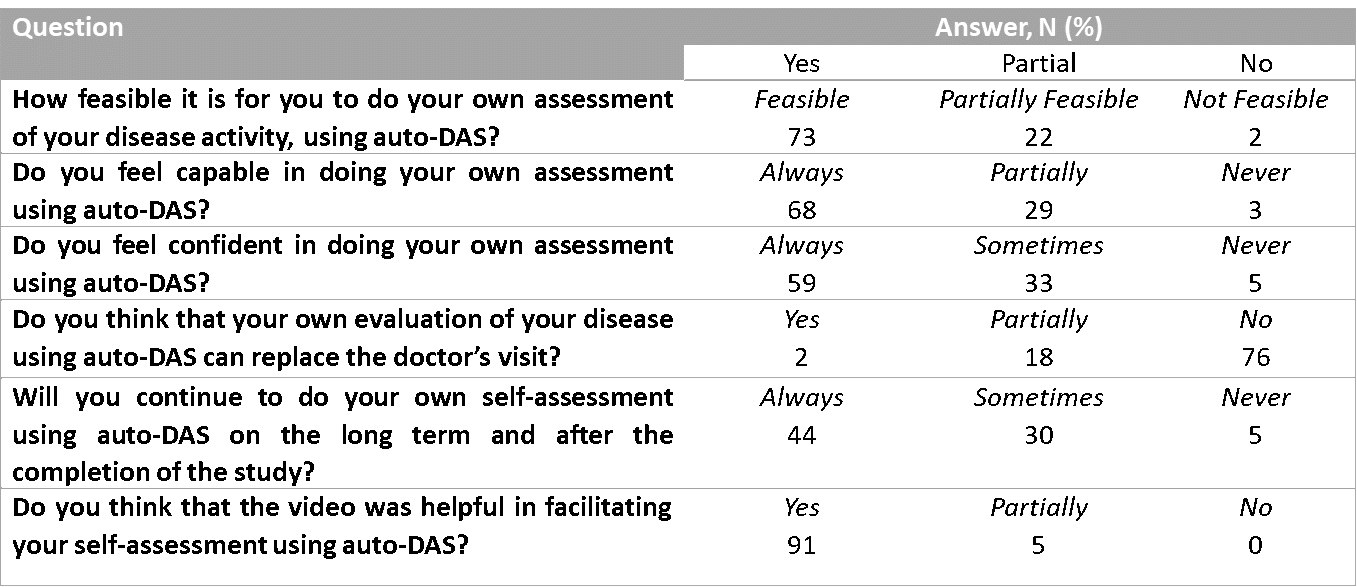Session Information
Date: Tuesday, October 23, 2018
Title: Patient Outcomes, Preferences, and Attitudes Poster II: Patient Perspectives
Session Type: ACR Poster Session C
Session Time: 9:00AM-11:00AM
Background/Purpose:
Empowering RA patients through education is linked to improved adherence, treatment decisions and speeding up the assessment process during consultation. The purpose of the study is to evaluate perceptions of patients with RA about self-assessment of their disease activity after watching an educational video about self-assessment using Disease Activity Score 28 (DAS28).
Methods:
An educational video was developed to instruct patients with RA on how to assess their disease activity using DAS28 (autoDAS). Consecutive RA patients attending rheumatology clinics during their routine visits (Bahrain, Egypt, Jordan, Lebanon, KSA, UAE) were invited to participate in a structured interview with the study coordinator after the doctor’s visit. A purposely-designed video was displayed first, followed by the interview that consisted of a combination of closed and qualitative open-end questions.
Results:
62 patients participated in the study (Fig1). 95% stated that performing their own assessment was feasible or partially feasible, and 97% said that they felt totally or partially capable of doing it. 59% answered that they felt confident in performing auto-DAS all the times. Nevertheless, 76% stated that it will not replace the doctor’s visit. The majority (96%) felt that the video was easy and helpful in facilitating their self-assessment (Fig2).
Open-end questions identified the main advantages: Better understanding of the disease (“makes me aware when disease is active, provides good education about disease, will help me cope better”), Easier communication with physician (“will inform me about the joint I need to tell my doctor about”), Time management (“Less time with physician, less visits meaning less cost”). They also identified some challenges: Calculation was cumbersome (with the calculator being easier than a website), Auto-assessment needs practice.
Conclusion:
The majority of patients felt that the video was helpful in many aspects of disease assessment, and felt capable of performing auto-evaluation, with DAS calculation being the hardest part. Most stated that it will not replace the doctor’s visit but will help better understanding of the disease and coping, thus better informing the doctor and reducing visit time.
Figure 1. Patients Characteristics
|
Patients, N
|
62
|
|
Age, mean
|
51.2 yo (SD 13.4)
|
|
Female
|
86%
|
|
University education
|
40%
|
|
RA duration, mean
|
9.3 years (SD 6.6)
|
|
Time to diagnosis, mean
|
1.9 years (SD 6.4)
|
|
Rheumatoid Factor +
|
67%
|
|
ACPA +
|
46%
|
|
Bone erosions
|
48%
|
|
Biologic treatment
|
32%
|
|
Targeted Synthetic DMARD
|
11%
|
|
Corticosteroids
|
24%
|
|
Common Comorbidities
|
Smoking 19%, Hypertension 13%, Osteoporosis 13%, Dyslipidemia 11%, Diabetes 11%, Fibromyalgia 6%
|
Figure 2. RA patients’ responses to some questions of the structured interview.
To cite this abstract in AMA style:
Ziade N, Saad S, al Mashaleh M, el Kibbi L, el Zorkany B, Badsha H, Harifi G, Daher A, Salloum N, Masri B, Arayssi T. Perceptions of Patients with Rheumatoid Arthritis about Self-Assessment of Disease Activity after Watching an Educational Video: Qualitative Pilot Results from the Auto-DAS in Middle Eastern Arab Countries Study [abstract]. Arthritis Rheumatol. 2018; 70 (suppl 9). https://acrabstracts.org/abstract/perceptions-of-patients-with-rheumatoid-arthritis-about-self-assessment-of-disease-activity-after-watching-an-educational-video-qualitative-pilot-results-from-the-auto-das-in-middle-eastern-arab-coun/. Accessed .« Back to 2018 ACR/ARHP Annual Meeting
ACR Meeting Abstracts - https://acrabstracts.org/abstract/perceptions-of-patients-with-rheumatoid-arthritis-about-self-assessment-of-disease-activity-after-watching-an-educational-video-qualitative-pilot-results-from-the-auto-das-in-middle-eastern-arab-coun/

